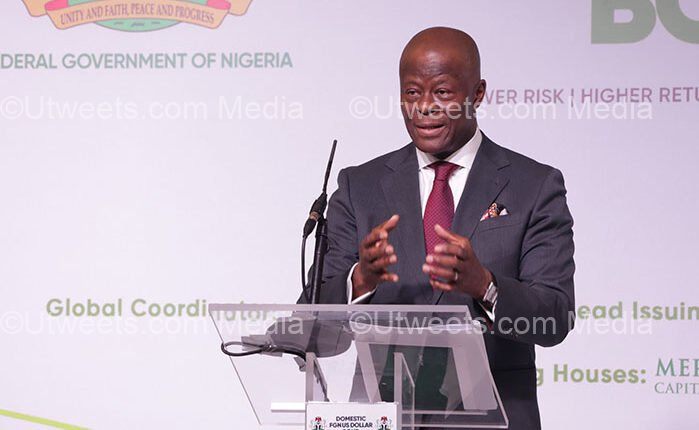ABUJA – The Federal Government on Thursday said the ongoing economic reforms have started yielding results, even as it acknowledged the sacrifices of Nigerians to this effect. The Minister of Finance and Coor P7 P7 dinating Minister of the Economy, Wale Edun, who stated this while appearing before the Senate Committee on Finance for an interactive session expressed appreciation of Nigerians’ endurance. ...Tap To Read The Full Story Here | ..Tap To Read The Full Story Here...
According to him, teething problems from the reforms are over for Nigerians as positive indicators for better days are already emerging.
He said: “The two critical reforms on market based price of Premium Motor Spirit ( PMS) and foreign exchange are now at the stage of results delivery and by extension, viability of the nation’s economy through restoration of fiscal viability.
“These two pillars of the economic reforms that have taken positive shape now, portends additional revenue for government, recovery of the finances of NNPCL and strong basis for growing the economy, in terms of attracting investment and creating of jobs. “I think we need to commend Nigerians for staying the cause to this stage of getting benefits”, he said.
Earlier in his welcome address to the nation’s economic managers, the Chairman of the Committee, Senator Sani Musa, said the session was a fact finding one on workability or otherwise of the various reforms.
He said: “Today we gather to deliberate on the pressing matters related to the sales of crude oil to domestic refineries in Nigeria, in naira and its implication on the approved medium-term expenditure framework and fiscal strategy paper for 2024-2026 and what we should expect for 2025-2027.
” Additionally, we will examine shortfalls in NMPCL revenue remittances, focusing on key areas such as foreign and domestic excess crude accounts, the signature bonus accounts, NMPCL cash call account and any outstanding or remitted revenue linked to under-recoveries.
“This meeting underscores our commitment to transparency, accountability and the responsible management of our national resources. “I am confident that with the collaboration of the Ministry of Finance under the able leadership of the coordinating Minister of the Economy, the Office of the Accountant General of the Federation, the Central Bank of Nigeria and Revenue Mobilization and Fiscal Commission and other critical stakeholders present here, we will identify solutions and ensure that due process are upheld for the benefit of our economy and the Nigerian people”.
Aside the Finance Minister, the Group Executive Officer (GCEO) of Nigerian National Petroleum Company Limited (NNPC ), Mele Kyari; the Director General of Nigeria Upstream Petroleum Regulatory Commission ( NUPRC), Gbenga Komolafe; representatives of governor of the Central Bank etc , also attended the session which was later joined by the President of the Senate, Godswill Akpabio, while in closed door.
FG Unlocks $1bn Across Energy Value Chain, Expects Two Major Investments By Mid 2025
Meanwhile, the Special Adviser to the President on Energy, Olu Verheijen, has said the Federal Government has been able to unlock over $1 billion in investments across the oil and gas value chain.
She said by the middle of 2025, government is expected to see FID on two more projects, including a multibillion-dollar deepwater exploration project, which will be the first of its kind in Nigeria in over a decade.
According to Verheijen, these milestones provide great opportunities in energy sector investments, especially in the Compressed Natural Gas (CNG). She gave this perspective at the African Energy Week taking place in Cape Town, South Africa.
At the summit, she underscored the untapped potential within the industry and discussed the recent reforms implemented by the President Bola Tinubu administration to attract investment.
Verheijen noted that the country has historically underperformed in oil and gas production despite Nigeria’s wealth in the oil and gas industry.
She referenced how countries like Brazil that has only 30% of Nigeria’s oil reserves has outperformed by producing 131% more than current production of Nigeria.
“Despite our abundant endowments, we have underperformed against our potential. For example, Brazil holds only 30% of Nigeria’s oil reserves but produces 131% more. This is largely due to under-investment,” she said.
She said that since 2016, Nigeria has attracted only 4% of African oil and gas investments, while investment has surged in other, less resource-rich nations.
“Since 2016, Nigeria has managed to attract only 4 percent of total investments in oil and gas, while less resourced countries in Africa have enjoyed a bigger share.
When we analyzed investment data, we also found that, between 2013, when Nigeria’s last deepwater project reached FID, and now, IOCs operating in Nigeria have committed more than $82 billion in deepwater investments in other countries that they have deemed to be more attractive destinations for their capital.”
Recognising this trend, the presidential aide highlighted many efforts by President Tinubu’s administration to enact reforms aimed at reshaping Nigeria’s investment landscape.
Among these initiatives, she said the government has introduced fiscal incentives targeting deep offshore and non-associated gas projects, marking the first time Nigeria has outlined a fiscal framework specifically for deepwater gas.
In efforts to enhance the upstream oil and gas sector, she said her office has collaborated closely with the office of the National Security Adviser to create and distribute focused security directives, leveraging insights garnered from on-ground operators.
Additionally, Verheijen revealed steps to streamline approval processes by clearly defining the regulatory scopes involved.
This initiative, she said, aims to significantly reduce the extended project timelines that have historically plagued the industry, as well as the high-cost premiums associated with operating in Nigeria.
She added, “Our target is to shorten the contracting timelines from an extensive 38 months to just 135 days, while also working to eliminate the 40% cost premium that currently exists within the Nigerian petroleum industry.
The presidential aide also revealed efforts by the current President Tinubu administration to further open up the oil and gas sector for bigger investments with a set of clear fiscal incentives for Non-Associated Gas and deep offshore oil & gas exploration and production.
“This is the first time that Nigeria is outlining a fiscal framework for deepwater gas since exploration in the basin commenced in 1991,” she said.
According to her, amongst other initiatives, there has been a focus on midstream and downstream investments in Compressed Natural Gas, (CNG), liquefied petroleum gas, and electric vehicles as part of the Presidential Gas for Growth Initiative.
She added that the administration has also worked to streamline regulatory processes, shorten project timelines, and reduce the high-cost premium of operating in Nigeria.
“We have also introduced fiscal incentives to catalyze investments in the midstream and downstream sectors, including, Compressed Natural Gas (CNG), Liquefied Petroleum Gas (LPG), and Mini Liquefied Natural Gas (LNG).
“These align with the broader Presidential Gas for Growth Initiative, which seeks to enable the displacement of PMS and diesel in three key sectors: heavy transport, decentralised power generation and cooking.
These incentives are also stimulating demand for electric vehicles. “Our goal is to eliminate the 40% cost premium within the Nigerian petroleum industry and cut down contracting timelines from 38 months to 135 days,” Verheijen stated. She said the government has unlocked over $1 billion across the energy value chain, with two more major investment projects expected by mid-2025.
Verheijen also addressed efforts by the Tinubu administration to revamp the nation’s power sector, with plans to provide more reliable electricity access for the 86 million Nigerians currently underserved. She said the scheme aims to improve revenue assurance and collection.
Other key measures include tackling legacy debt, deploying seven million smart meters to reduce losses, and expanding off-grid solutions for remote communities.
By 2027, Nigeria aims to ensure 20 hours of electricity daily for consumers in urban areas and industrial hubs.
Highlighting recent macroeconomic reforms such as petrol subsidy removal and foreign exchange liberalisation, Verheijen expressed confidence that Nigeria is set for unprecedented growth.
“Under President Tinubu’s leadership, Nigeria is championing reforms to unlock its vast economic potential and create jobs,” she concluded, inviting foreign partners to participate in Nigeria’s next chapter of growth.



